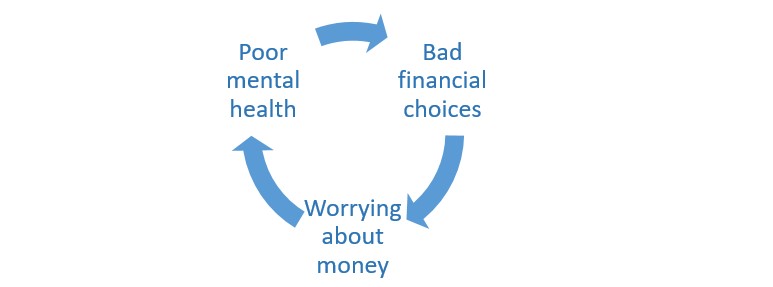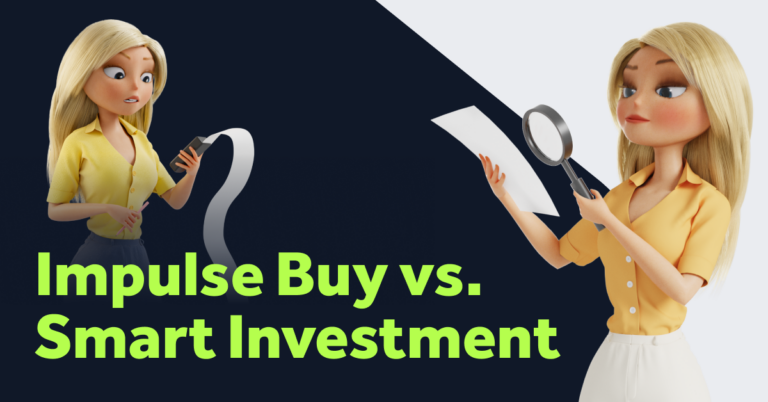Taking care your mental health is vital—not just for your personal well-being, but for your financial well-being too. Yes, your psychological state and personal finances are connected, and they directly affect one another. If you don’t manage both of them effectively, you and your budget could suffer the consequences. Let’s take a look at how you can manage and make the most of your psychological and financial happiness.

When you suffer from poor mental health it could make it harder to earn money and to manage your finances. This means you end up worrying about money, which, in turn, makes your mental health state even worse. And from there, you can get trapped in a vicious cycle.

If you are trapped in this cycle, the first thing you need to do is figure out what is the root cause that got you in it in the first place. Are your finances affecting your mood, or are your moods affecting your finances? If the idea of doing your finances, checking your expenses and paying your bills makes your heart sink, then finances are negatively impacting your mental state. On the other hand, if you are feeling miserable and don’t want to face life and instead spend money, go shopping, or obsess about your money, then your mental state is negatively impacting on your finances.
An easy way to determine where you are in the cycle, and to learn how to manage it, is by keeping a spending diary. Use it to keep track of your expenses and moods to see what correlation you find between your emotions and your spending habits. In a previous blogpost, we’ve talked about how emotions can negatively impact your investments and finances, so it’s vital that you don’t let your emotions control your financial decisions.
Out of control
When you’re experiencing negative emotions or struggling with money, it can feel like you have no control and are completely overwhelmed by your circumstances and financial burdens. When you’re feeling like this, saving up for the future, or investing your money smartly is the last thing you’re thinking about. All you might want to do is feel in control again and that’s when you might make hasty and impulsive financial decisions. You can check out this video on why hasty financial decisions are almost never a good idea.
When you’re feeling this overwhelmed, you’ll also want to avoid facing any responsibilities, simply because you don’t feel like you can handle them. Unfortunately, some responsibilities, like financial obligations, aren’t something you can postpone indefinitely. So take a day for yourself to relax, de-stress and improve your mood, but then make a point of tackling those bills and payments the next day. The best part? You’ll feel a whole lot better once you’ve completed them.
Too much control
There is also the opposite reaction where instead of not wanting to do anything with your finances, you obsess over every cent. Although this might mean you know exactly what’s going on with your money, it could also mean that you’re addicted to staying up to date with the news and your investments.

Obsessing over your investments or money could lead your mental health to suffer even further. If that’s the case, then Go & Grow is a great solution as it is a hands-off investing product. You don’t need to obsess over every little detail or feel like one wrong move could negatively impact your investment as it’s almost completely automated and runs in the background. With Go & Grow, your investment is one less thing you have to worry about.
Retail therapy now – shopping guilt later
Have you ever gone on a shopping spree when you were feeling down and purchased things you didn’t really want? Or have you ever bought something you didn’t need, just because it made you feel better? This emotional spending behavior, universally known as ‘retail therapy’, is a very common incident that happens to almost everyone. And there’s a good reason for that; it makes you feel in control, it releases dopamine, and you get to escape reality, even if it is only for a moment.

Retail therapy is often seen as a harmless, fun activity, but if it happens all the time, you could end up shopping all your savings away, getting yourself into more financial trouble. And so, your poor mental state negatively impacts your personal finance.
So, the first step to avoiding shopping guilt is recognizing your weak points so you can overcome them and not let them get the best of you. Use your spending diary to figure out what triggers you when you get the urge to spend money. Is it when you’re having a tough day at work? If you’re feeling lonely? When you’ve had a fight with someone close to you? Or simply when you’re bored? Once you know what triggers you, you can recognize it when it’s happening and try to not let it control you. This will require discipline, but it will help you stay in control of your finances, and improve your mental health in the long run.
Look after yourself
Mental health is everything. You should always prioritize your happiness and personal well-being, especially considering the difficult times we find ourselves in. The current health crisis and consequential economic crisis will take its toll on people’s mental and financial health. Mental health is proven to deteriorate when income becomes unstable. So it’s vital that you make it a priority to look after your mental health and avoid falling into the money-mental health cycle.

With the uncertainty and unsecure future, wanting to get a quick fix and buying yourself something nice is understandable, but it could cause more problems down the line. Instead, do something that takes your mind off of things and de-stresses you that won’t negatively influence your finances, like reading a book, exercising, going for a walk, or drinking a cup of tea and just looking out your window. Once you’ve replaced emotional spending with a healthier, and possibly free, alternative, it will become easier to not be dependent on the high that comes with emotional spending.
It will also become easier to practice better financial habits. This will ensure better financial security during uncertain times, which will help protect your mental health. Managing your financial wellbeing, which is something you can control, will help you feel more capable of dealing with the things you can’t control.
Phone a friend
You should always ask for help when you need it—whether it’s regarding your finances, or your mental health. Get in contact with a friend or family member you trust and talk to them when you’re experiencing problems. By not feeling alone, and being able to share your burden, you’ll already feel better about it. And when it comes to your finances, don’t be afraid to seek out a professional.
Breaking the cycle
Maintaining good mental health and fostering good financial habits might take some hard work and discipline, but it is definitely worth it. If you find yourself in the cycle, take the time to get yourself out of it. We hope the topics we touched on in this article can help you. Your emotional health and your long-term financial freedom should always be a top priority. And if you manage both effectively, they will work together to help you maintain both your mental and financial well-being.


